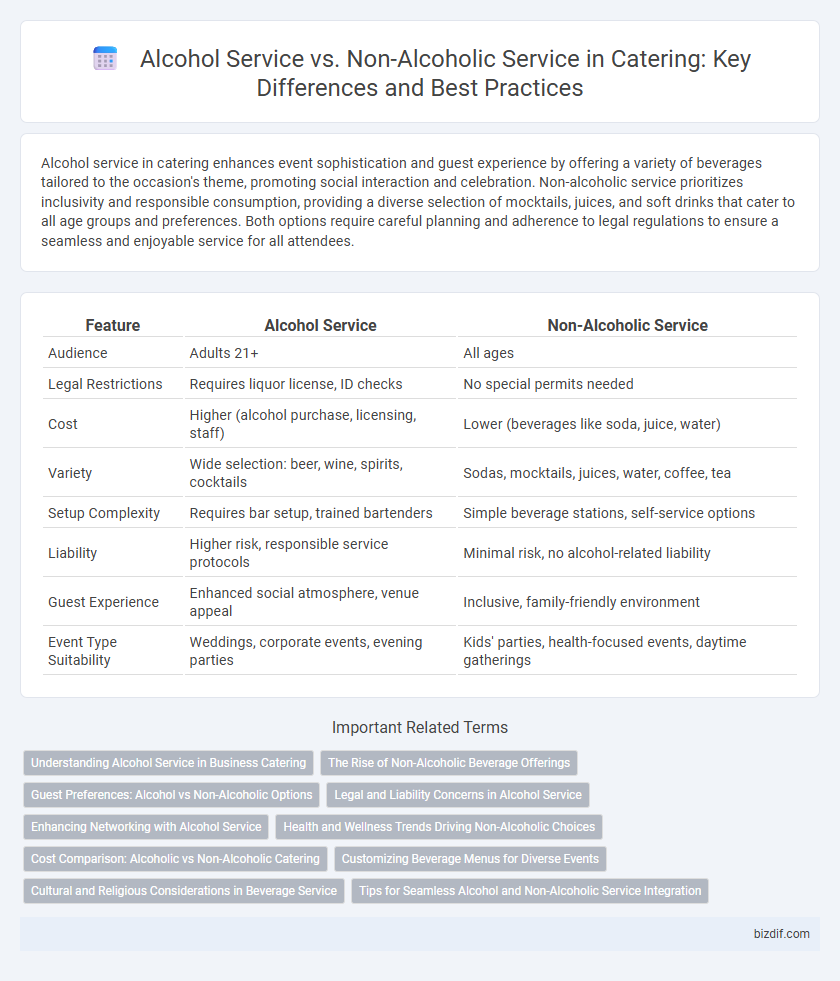Alcohol service in catering enhances event sophistication and guest experience by offering a variety of beverages tailored to the occasion's theme, promoting social interaction and celebration. Non-alcoholic service prioritizes inclusivity and responsible consumption, providing a diverse selection of mocktails, juices, and soft drinks that cater to all age groups and preferences. Both options require careful planning and adherence to legal regulations to ensure a seamless and enjoyable service for all attendees.
Table of Comparison
| Feature | Alcohol Service | Non-Alcoholic Service |
|---|---|---|
| Audience | Adults 21+ | All ages |
| Legal Restrictions | Requires liquor license, ID checks | No special permits needed |
| Cost | Higher (alcohol purchase, licensing, staff) | Lower (beverages like soda, juice, water) |
| Variety | Wide selection: beer, wine, spirits, cocktails | Sodas, mocktails, juices, water, coffee, tea |
| Setup Complexity | Requires bar setup, trained bartenders | Simple beverage stations, self-service options |
| Liability | Higher risk, responsible service protocols | Minimal risk, no alcohol-related liability |
| Guest Experience | Enhanced social atmosphere, venue appeal | Inclusive, family-friendly environment |
| Event Type Suitability | Weddings, corporate events, evening parties | Kids' parties, health-focused events, daytime gatherings |
Understanding Alcohol Service in Business Catering
Alcohol service in business catering enhances guest experience by offering wine, beer, and cocktails tailored to corporate events, fostering social interaction and networking. Strict adherence to legal regulations and responsible serving practices ensures compliance and safety. Non-alcoholic service provides inclusive beverage options such as mocktails, juices, and sparkling water, accommodating all guests' preferences and promoting a professional environment.
The Rise of Non-Alcoholic Beverage Offerings
Non-alcoholic beverage offerings have surged in popularity within catering services, reflecting a growing consumer preference for healthier lifestyle choices and inclusive event options. The rise of sophisticated mocktails, artisanal sodas, and premium non-alcoholic spirits enables caterers to deliver diverse, flavorful experiences without alcohol. This trend aligns with increased demand for alcohol-free alternatives at corporate events, weddings, and social gatherings, supporting both guest safety and broader demographic appeal.
Guest Preferences: Alcohol vs Non-Alcoholic Options
Guest preferences in catering often dictate the balance between alcohol and non-alcoholic service, with a growing demand for inclusive beverage options. Providing a diverse selection of craft cocktails, fine wines, and premium spirits alongside specialty mocktails, artisanal sodas, and fresh juices addresses varying tastes and dietary restrictions. Catering professionals who prioritize customizable drink menus enhance guest satisfaction and promote a welcoming atmosphere for all attendees.
Legal and Liability Concerns in Alcohol Service
Alcohol service in catering requires strict adherence to legal regulations, including obtaining proper licenses and ensuring servers are trained in responsible alcohol service to prevent overconsumption and underage drinking. Liability concerns arise from potential accidents or injuries caused by intoxicated guests, making event organizers susceptible to lawsuits and fines under dram shop laws. Non-alcoholic service eliminates these legal risks, offering a safer and more compliant option for catering events with diverse guest needs.
Enhancing Networking with Alcohol Service
Alcohol service in catering events often enhances networking by creating a relaxed atmosphere that encourages open conversations and social bonding. Offering a curated selection of wines, craft beers, and signature cocktails can elevate guest experience, fostering connections and memorable interactions. In contrast, non-alcoholic service emphasizes inclusivity and sobriety, catering to diverse preferences while maintaining a professional networking environment.
Health and Wellness Trends Driving Non-Alcoholic Choices
Health and wellness trends significantly influence the rise of non-alcoholic service in catering, with consumers increasingly seeking beverages that support mental clarity, hydration, and overall well-being. Non-alcoholic options such as mocktails, kombucha, and infused waters offer flavorful alternatives without the negative effects of alcohol, appealing to health-conscious guests and those practicing moderation. Catering services that prioritize these choices can attract a broader clientele by aligning with the growing demand for mindful consumption and wellness-focused events.
Cost Comparison: Alcoholic vs Non-Alcoholic Catering
Alcohol service in catering generally incurs higher costs due to liquor licenses, bartending staff, and premium beverage selections, often tripling expenses compared to non-alcoholic options. Non-alcoholic service reduces financial outlay by eliminating the need for specialized permits and minimizing staffing requirements, while offering a variety of affordable beverages like infused waters, juices, and mocktails. Choosing non-alcoholic catering can substantially lower overall event costs and simplify logistics without compromising guest satisfaction.
Customizing Beverage Menus for Diverse Events
Customizing beverage menus for diverse events requires careful consideration of alcohol service versus non-alcoholic options to cater to all guest preferences and legal requirements. Including a balanced selection of craft cocktails, local wines, and signature mocktails enhances the overall guest experience while ensuring inclusivity. Event planners should collaborate with professional caterers to design tailored beverage packages that complement specific event themes and dietary restrictions.
Cultural and Religious Considerations in Beverage Service
Cultural and religious considerations significantly influence catering beverage service, requiring careful selection between alcohol and non-alcoholic options to respect diverse beliefs and practices. Many cultures and religions prohibit alcohol consumption, such as Islam, which mandates halal guidelines emphasizing non-alcoholic beverages, while others may allow limited or ritualistic alcohol use. Catering services must tailor their offerings by understanding these cultural sensitivities to ensure inclusive and respectful event experiences.
Tips for Seamless Alcohol and Non-Alcoholic Service Integration
Ensuring seamless integration of alcohol and non-alcoholic service at catering events requires meticulous planning and staff training on beverage options and responsible serving practices. Offering clearly labeled beverage stations with diverse drink choices, including mocktails and specialty non-alcoholic drinks, enhances guest satisfaction and reduces service errors. Incorporating real-time communication tools for staff coordination improves efficiency and maintains consistent service quality throughout the event.
Alcohol service vs Non-alcoholic service Infographic

 bizdif.com
bizdif.com